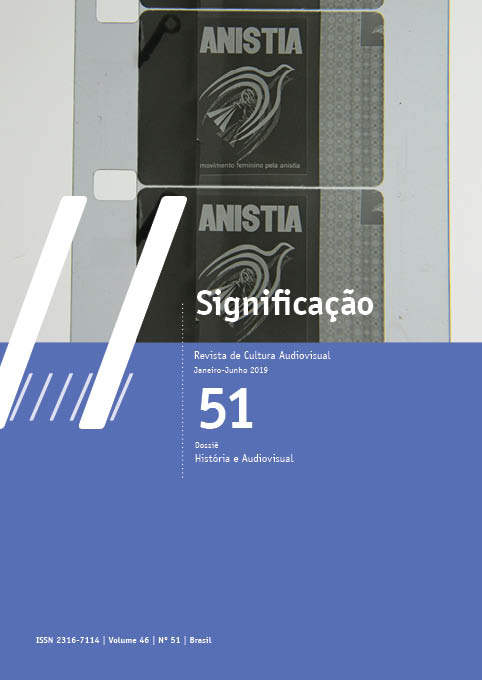Subjectivity and domestic ethnography in Last Words
DOI:
https://doi.org/10.11606/issn.2316-7114.sig.2019.144554Keywords:
documentary, subjectivity, reflexive mode, death, ethnography.Abstract
This article aims to analyze the documentary Last words (1998), from the Dutch filmmaker Johan van der Keuken. Author of more than 50 documentaries, Van der Keuken stands out by his constant experimentation in filmmaking, both with respect to formal aspects and to themes. Last words, one of the filmmaker’s last films, is an example of his entering into the field of the reflexive documentary by recording the last moments of his sister Joke’s life, who is suffering from cancer. The analysis here focusses on the film representation of subjectivity and death and how Van der Keuken makes a domestic ethnography in which he remembers and rethinks, through his sister, his own background and family life.
Downloads
References
BRANIGAN, E. Point of view in the cinema: a theory of narration and subjectivity in classical film. Berlin: Mouton Publishers, 1984.
BELLOUR, R. Entre-imagens. Campinas: Papirus, 1997.
GAUDREAULT, A. Du littéraire au filmique: systeme du récit. Paris Meridiens Klincksieck, 1989.
MACDOUGALL, D. “The subjective voice in ethnographic film”. In: DEVEREAUX, L.; HILLMAN, R. (Eds.). Fields of vision: essays in film studies, visual anthropology and photography. Berkeley: University of California Press, 1995, p. 217-255.
ODIN, R. (Org). Les films de famille. Paris: Librairie des Méridiens, 1995.
RAMOS, F. P. Mas afinal o que é mesmo documentário? São Paulo: Senac, 2008.
RENOV, M. “Domestic ethnography and the construction of the ‘other’ self”. In: GAINES, J. M.; RENOV, M. (Eds.). Collecting visible evidence. Minneapolis: University of Minnesota Press, 1999, p. 140-155.
______. The subject of documentary. Minneapolis: University of Minnesota Press, 2004.
SOBCHACK. V. “Inscrevendo o espaço ético: dez proposições sobre a morte, representação e documentário”. In: RAMOS, F. P. Teoria contemporânea do cinema. São Paulo: Senac, 2005, p. 127-158.
WATT, I. A ascensão do romance. São Paulo: Companhia das Letras, 2010.
WALTON, K. L. “Sobre imagens e fotografias: respostas a algumas objeções”. In: RAMOS, F. P. Teoria contemporânea do cinema. São Paulo: Senac, 2005, p. 105-125.
Downloads
Published
Issue
Section
License
Copyright (c) 2019 Beatriz D’Angelo Braz

This work is licensed under a Creative Commons Attribution-NonCommercial 4.0 International License.
Authors who publish in this journal must agree with the following terms:
- Authors keep their copyrights and grant the journal first time publication rights, having their articles simultaneously licensed under the Creative Commons Attribution License, which allows sharing texts with authorship recognition and first publication on this journal for non-commercial purposes.
- Authors are allowed to make additional contracts, for a non-exclusive distribution of the article’s version published on this journal (e.g.: publishing in institutional repositories of articles or as a book chapter), with authorship recognition and first publication on this journal.
















